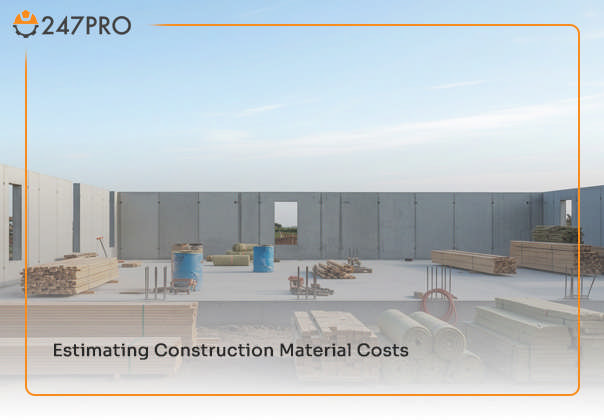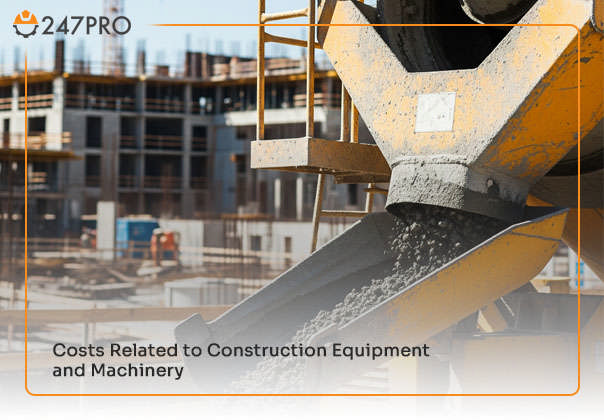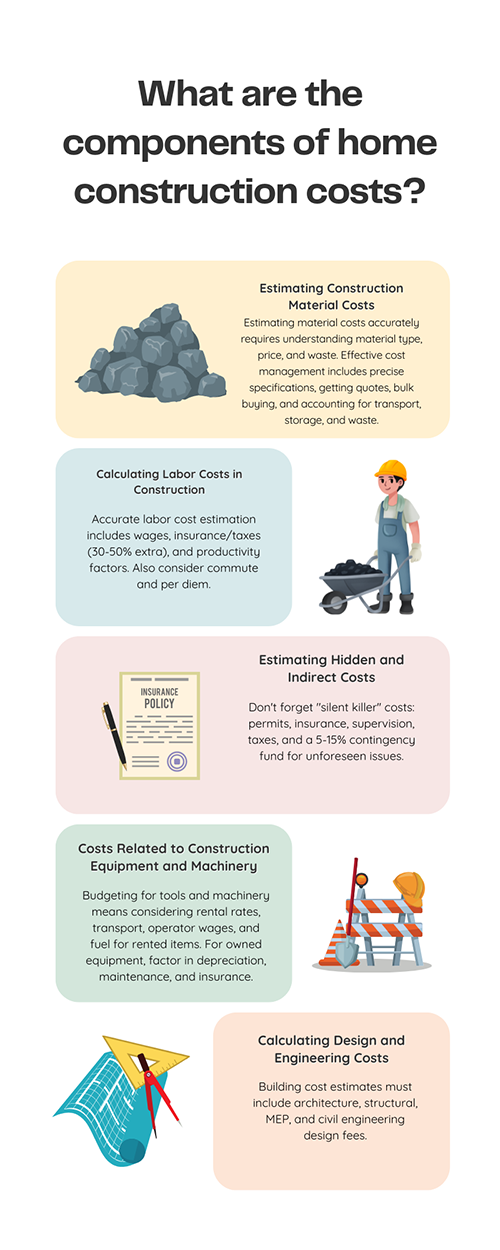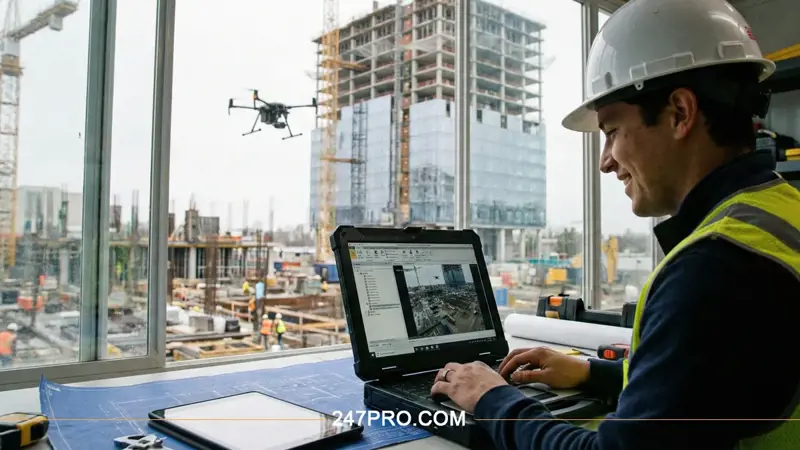Understanding the precise cost of a construction project is the winning factor for clients, property owners, investors, and contractors. Without a detailed cost breakdown of building a house, the project will soon face severe challenges, such as budget overruns and schedule delays. The detailed breakdown aims to show every aspect of project expenditure, helping you achieve the most precise cost estimation.
We will teach you how to calculate construction cost of house per square foot as accurately as possible, and we will discuss a framework that helps you predict and manage every financial challenge you might face during your construction work

Estimating Construction Material Costs
Materials are the cornerstone of any construction project, usually taking up the significant majority of the project budget. A precise estimation of the materials cost requires understanding these three points:
- Type of materials
- Price of materials
- Materials waste
Understanding the three key characteristics of material type, price, and waste is crucial for accurate estimation. Any change in these factors can halt you from calculating the construction cost of a house accurately. It's important to note that most constructive change orders occur at this stage. To manage material costs effectively, consider these points:
- Specify material: clearly define what you actually need. Detailed material specifications, from foundation to finishes, will prevent costly substitutions later.
- Quality plays a significant role in material costs. The cost of materials can vary greatly based on their quality and brand. It's important to consider this when estimating your project's budget.
- Supplier Quotes: Due to various factors, including location, current market trends, and the supply and demand chain, prices can vary. To secure the best pricing, it's advisable to obtain quotes from multiple suppliers.
- Quantity of materials: If you can manage to store the materials, consider economies of scale by buying materials in bulk, which often come with significant discounts.
- Transportation fee: Material delivery can be costly, especially for heavy materials, and delivering materials to a remote site can also increase the price.
- Storage Costs: Storing materials on-site and off-site both will require space rental and security.
- Waste Factor: It is wise to consider 5-15% of your dedicated budget for materials, to cover any possible waste and damage that might arise.

Calculating Labor Costs in Construction
Labor costs are one of the main items to consider when creating a cost breakdown of building a house. Accurately estimating the labor cost will require considering the following:
- Wages refer to the hourly rate directly paid to workers, which can vary based on region, union agreements, and the availability of workers. This is the hourly rate or salary paid directly to skilled tradespeople (such as carpenters, electricians, plumbers, and masons) and general laborers. Rates vary widely by trade, experience, and region.
- Insurance and Taxes: In addition to the direct wages, you need to pay for health insurance, retirement plans, and paid time off, as well as payroll taxes. This usually adds a 30 to 50% to direct wages.
- Productivity factors: some factors play a role in the productivity of the workers:
- Experience Level
- Site Conditions
- Tools and Equipment
- Supervision
- Commute and Per Diem: In some projects, workers may need to stay overnight or travel to the worksite, which will include the costs for transportation, accommodation, and daily allowances.
Estimating Hidden and Indirect Costs
Some items are often overlooked when estimating the cost of a building project; in our terminology, we refer to them as "silent killers" because they can significantly inflate the project’s budget if not properly addressed.
- Permits: Every construction project requires some mandatory permits, such as zoning approvals and inspections from local authorities. They can vary based on your state and even city. Carefully research and include their cost in your estimation.
- Insurance: Set a budget for project insurance, including builder's risk insurance, general liability insurance, and workers' compensation.
- Supervision and Administration: This includes the funds for project managers, site supervisors, administrative staff, and safety officers
- Taxes: tax on materials, property, and other governmental levies.
- Contingency: It is safe to say that this is the most significant hidden cost of a construction project; you must include a contingency fund, which is typically 5-15% of the total project cost, to cover unforeseen issues, design changes, or material price increases.

Costs Related to Construction Equipment and Machinery
Efficient construction requires the right tools and machinery, too. Accurately budgeting for these items involves the following considerations:
- Rental Costs: For specialized and heavy machinery like cranes, loaders, and excavators, consider these factors
- Daily, Weekly, Monthly Rates.
- Transportation/Mobilization Fees
- Operator Wages
- Fuel Costs
- Depreciation: If you own the equipment, account for its depreciation over the project's life and the initial capital investment.
- Maintenance and Repairs: allocate budget for routine maintenance, repairs, servicing, fuel, and operational costs.
- Insurance for Equipment: You need to have insurance for any potential damage, theft, or liability related to equipment
Calculating Design and Engineering Costs
Architecture and design are other crucial factors to consider when estimating the cost of a building.
- Architecture: fees for architectural design, schematic design, design development, and construction documents.
- Structural Engineering: costs that are related to structural engineering and designing the building’s skeletal system.
- Mechanical, Electrical, and Plumbing (MEP) Engineering: fees for designing HVAC, electrical power, plumbing, data networks, and water/waste systems.
- Civil Engineering: fees for site grading, drainage, and utility connections.

Risk Management in Cost Estimation: How to Manage Uncertainties?
While precise estimation can minimise the financial error to a great extent, it is important to know that you can not predict everything that might happen; therefore, it is important to acquire risk management skills to manage financial crisis and prevent budget overrun, to mange any potencial risk, equipe yourself with the following skills:
- Identify Potential Risks: By continuously monitoring the project, it is highly possible to identify any risk before it causes damage. So, consider these categories of risks in construction sites:
- Site Risk
- Market Risks
- Regulatory Risks
- Design Risks
- Force Majeure
- Contingency Strategically: As we discussed earlier, set aside 5-15% of the total project cost as a contingency fund to manage any unexpected financial issues that may arise.
- Insurance: Using appropriate insurance policies can transfer financial risk to an insurer.
- Contractual Risk Allocation: In your contract, you can define who is responsible for specific unexpected issues. For example, in the case of an earthquake, the insurance company is responsible for compensating the homeowner, not the contractor. This can prevent many legal disputes.
- Regular Risk Reviews: Periodically assess projects to identify potential risks. Some construction project management firms will help you with risk management by employing experienced specialists or provide you with consulting in this regard.
Real example of Cost Breakdown
As you witnessed, by meticulously breaking down each element of your project, you can have a more accurate and reliable estimation and set a budget accordingly. Here is an example of a simple cost breakdown of building a house with the following characteristics: a 1,200 sq ft detached house in Houston, Texas, with standard components:

For more information on a construction cost estimator, it is highly recommended to read "The Ultimate Guide to Construction Cost Estimation and Calculations: From Renovation to New Builds" to gain a comprehensive understanding of this crucial pre-construction step.


